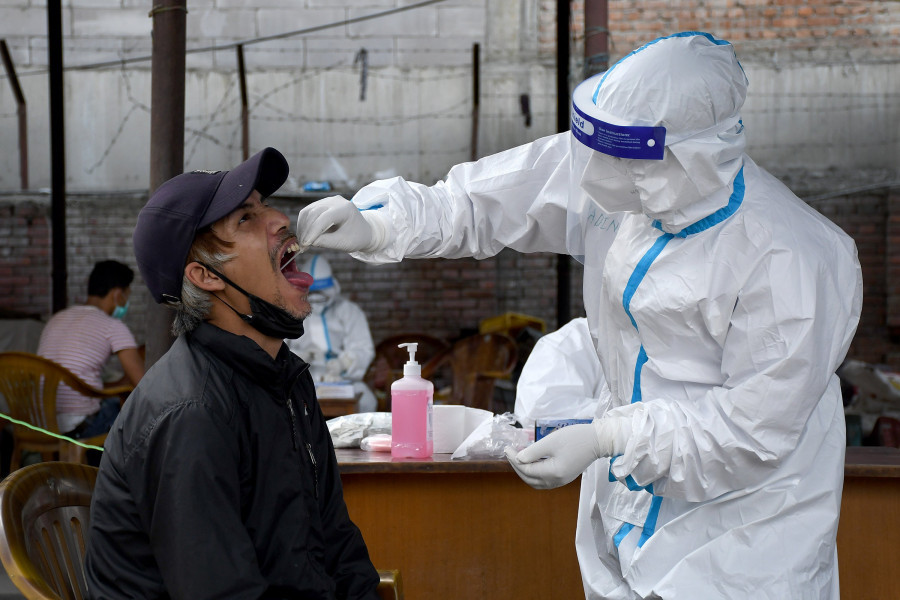Health
Major coronavirus crisis looms as Health Ministry reduces sample collection and test range
Health experts warn the government is making a serious mistake by lowering the test numbers.
Arjun Poudel
Health experts have said that the country is veering towards a major coronavirus crisis as the government has reduced the sample collection and daily testing range and touting the declining infection cases as an achievement.
The daily infection rates of the past couple of days suggest that coronavirus is dissipating, and the Ministry of Health and Population has claimed that the cases are declining by the day.
On Thursday 108 people tested positive for the coronavirus infection, which causes Covid-19. The number was 255 on Wednesday, 204 on Tuesday and 180 on Monday.
However, the decline in the number of infections does not support the government claim, as the Health Ministry has reduced the daily test numbers in recent days.
Only 4,588 samples were tested on Thursday. Earlier, over 7,000 samples used to be tested daily, hence the high number of infection cases.
"No case will be detected if you stopped the tests," Dr Mingmar Gyelgen Sherpa, former director general at the Department of Health Services, told the Post. "If the government is in a hurry to declare the country free of coronavirus, it could stop the tests, but that doesn’t mean this will address the risk."
The Health Ministry had vowed to perform 10,000 daily tests from June 29, a decision that was prompted following the youth-led protests against the government’s poor handling of the Covid-19 pandemic.
But instead of increasing the tests, the ministry has revised its guidelines, effectively narrowing the range of sample collection for the coronavirus tests.
The ministry has also issued a strict direction to the health workers to follow the revised guidelines by the book while collecting swab samples from suspected coronavirus infected individuals, or else the concerned health facilities will have to bear the test expenses.
The ministry’s edict has led to a severe decline in the daily number of sample collection.
Earlier, thousands of samples used to be in the test queue. There were no samples in the queue on Thursday.
"We are making a serious mistake by reducing our sample collection range. Obviously, decline in the test numbers will give you fewer positive cases, but that doesn’t mean there is no risk,"Dr Bhagwan Koirala, chairman of Nepal Medical Council, said. "We must expand the testing criteria as suggested by the global scientific community."
Coronavirus infections are being reported among the people who have not come into contact with the infected individuals and have not been to the infected areas. Infections have also been reported among the patients and health workers in non-Covid hospitals.
The number of such infections are in hundreds, and yet the government has been maintaining that the coronavirus infection has not reached the community transmission stage.
Health experts say the government’s decision to reduce the test numbers at this time could be deleterious.
Dr Koirala said the government is making a fool of itself by claiming that there are no cases of community transmission as the public at large and medical professionals do not believe this claim
"It will be very difficult to control the situation if the virus were to spread in wider communities. Fewer tests at this time means jeopardising the public health," he said. "We have to increase our test range, focus on contact tracing and isolate the infected people. That’s our best bet."
Health experts have urged the government to immediately revise its testing guidelines to increase the sample collection range before there are multiple community infection outbreaks.
According to the existing test guidelines, one must exhibit all symptoms associated with the coronavirus infection in order to get the free test.
This method is dangerous because there are many poor patients who simply cannot afford to pay for polymerase chain reaction tests.
"The government has been testing the people who have returned from the disease-hit countries, those placed in quarantines and the people who have come into contact with the above two groups," Dr Anup Subedee, an expert on infectious disease, told the Post. "Instead of increasing the test range, we are reducing the tests. This is too dangerous. "
Subedee added the increase in infection rates among health workers means the transmission rate of coronavirus has increased significantly.
The Health Ministry has narrowed the testing range based on a wrong argument: testing is not treatment and the country cannot afford more tests.
“In order to mitigate the risk, we should test all symptomatic patients and conduct random tests on people in the hotspots as well as health workers,” Dr Anup Bastola, spokesperson for Sukraraj Tropical and Infectious Disease Hospital in Teku, Kathmandu, said.




 13.12°C Kathmandu
13.12°C Kathmandu















